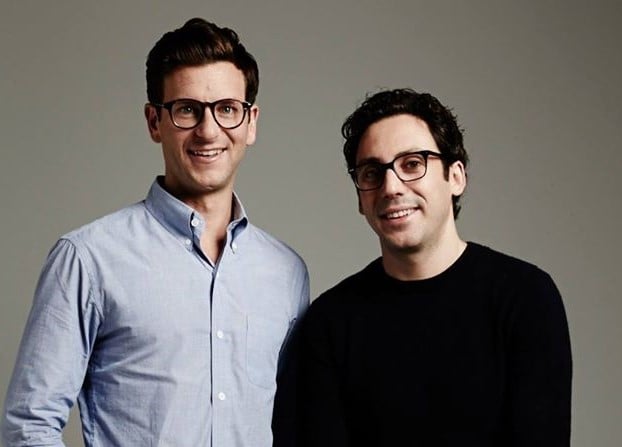Warby Parker co-CEOs Neil Blumenthal and Dave Gilboa.
Founders get their startup inspiration from all kinds of places.
You may be trying to solve a problem you’ve faced in your corporate life, tackle an environmental or social problem facing our world, spied a gap in the market as a consumer or have a passion that you want to leave the corporate hamster wheel to pursue.
Solving one of your own pain points is an extremely common source of entrepreneurial fire. Many founders feel the personal connection gives you a head start; you are your own first use case and already know how much solving the problem is worth, both to an end user and your own business.
Take Neil Blumenthal and the eyewear business he co-founded, Warby Parker.
The pain point that spurred Blumenthal was a lack of affordable glasses, driven by a monopoly that had kept prices artificially high. He often tells the story of a student friend who lost his glasses on a backpacking trip. The cost of replacing them was so high that his fellow student spent the first semester of grad school without them, squinting, complaining and struggling to learn.
Blumenthal and Warby Parker also represent another trend in startups: the desire to leave a non-financial legacy. While he launched Warby Parker to offer designer eyewear at a revolutionary price, Blumenthal also was a pioneer for socially conscious businesses. Warby Parker claims almost one billion people – 15% of the world’s population – lack access to glasses and therefore struggle to learn or work. So for every pair of glasses sold, Warby Parker distributes another pair to someone in need around the world.
Altruism can mean rich pickings in the startup world for accelerators and investors alike. On my recent trip to Silicon Valley, I saw a leading accelerator ploughing significant resources into startups seeking to solve some of the world’s biggest problems, either directly with their business idea or indirectly through a social mission, as Warby Parker has.
Such an ethical lens is increasingly common as founders pursue business ideas to solve big environmental or social problems, incorporate serious ESG criteria in their startup or structure their business to ensure a legacy that mirrors the financial success of their business.
Some have even applied innovation and startup passion to altruism itself, such as Pledge 1%, which makes it easier for other startups to do good. Pledge 1% inspires early–stage corporate philanthropy by encouraging founders to pledge one per cent of their equity, time, product or profit. Its supporters already include high profile founders including Atlassian’s Scott Farquhar, who contributes a combination of one per cent of the software giant’s annual profits, employee time and company equity to a range of charities.
VC firms like Right Click Capital also help founders with a purpose. Most VCs have an ESG policy that lays out negative screens, such as tobacco and firearms, and a screen to identify and manage ESG risks such as those that can afflict the supply chain and social licenses to operate.
Many VCs, however, also apply a screen to recognise and give greater weighting to positive contributions. These positive screens typically align with sustainable development goals (SDGs), the 17 goals the United Nations considers urgent if we’re to address the world’s greatest challenges.
If you’re considering your legacy and how it can help attract investors, you should think about it as soon as you start your business. The Founder Institute is the world’s largest pre-seed accelerator, working with early stage founders and teams to ensure their businesses are aligned with investor expectations. Its Start-up Alignment 2020 initiative will make it even easier for investors to connect with founders with businesses whose mission is to solve some of the greatest problems facing the world.
Our early feedback suggests this initiative will be enormously popular, which makes it clear that founders – from those who are solving a problem through to those simply trying to escape the corporate grind – will be judged by investors on whether you care about making a difference to the world.
Of course, while many investors reward good corporate citizenship with investment, founders should not expect that this alone will make your business a hit. Doing good in business is now a fundamental expectation consumers have of all businesses. Warby Parker found that its “buy a pair, give a pair” did not drive sales of glasses, and this message has since been relegated to the social mission page. Now the company encourages fellow founders to follow suit, rather than asking consumers to buy in order to give.
So founders should take heed – customers will care and respect your business for its social conscience, but the business must deliver on all counts, including sales. Neil Blumenthal said “at its best, entrepreneurship creates jobs, solves problems and galvanises creative thinking.”
Warby Parker has indeed solved both consumer problems and larger social problems, as well inspiring startups to follow. That’s 20/20 vision.
- Benjamin Chong is a partner at venture capital firm Right Click Capital, investors in high-growth technology businesses.




















Trending
Daily startup news and insights, delivered to your inbox.